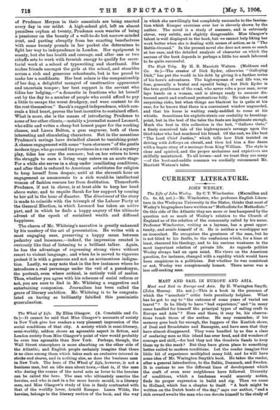The Wheel of Life. By Ellen Glasgow. (A. Constable and
Co. 6s.)—It cannot be said that Miss Glasgow's accounts of society in New York give her readers a very pleasant impression of the social conditions of that city. A society which is semi-literary, semi-worldly, seldom shows an agreeable aspect in fiction, and London society from Miss Glasgow's point of view would probably be even less agreeable than New York. Perhaps, though, the Wall Street atmosphere is more absorbing on the other side of the Atlantic; and English people certainly imagine that there iB no class among them which takes such an exclusive interest in stocks and shares, and in nothing else, as does the business man in New York. The hero of The Wheel of Life, however, is not a business man, but an idle man about town,—that is, if the man who during the course of the novel acts as lover to the heroine can be called the hero. The man who ultimately marries the heroine, and who is cast in a far more heroic mould, is a literary man, and Miss Glasgow's study of him is finely contrasted with that of the worldly lover, Arnold Kemper. Laura Wilde, the heroine, belongs to the literary section of the book, and the way in which she unwillingly but completely succumbs to the fascina- tion which Kemper exercises over her is cleverly shown by the author. The novel is a study of manners, and is extremely clever, very subtle, and slightly disagreeable. Miss Glasgow's talent is well displayed in the book, but we cannot help liking her work better when she is dealing with scenes of action, as in "The Battle-Ground." In the present novel she does not seem so much at her ease, and the detailed analysis of character on which the success of the book depends is perhaps a little too much laboured to be quite successful.








































 Previous page
Previous page